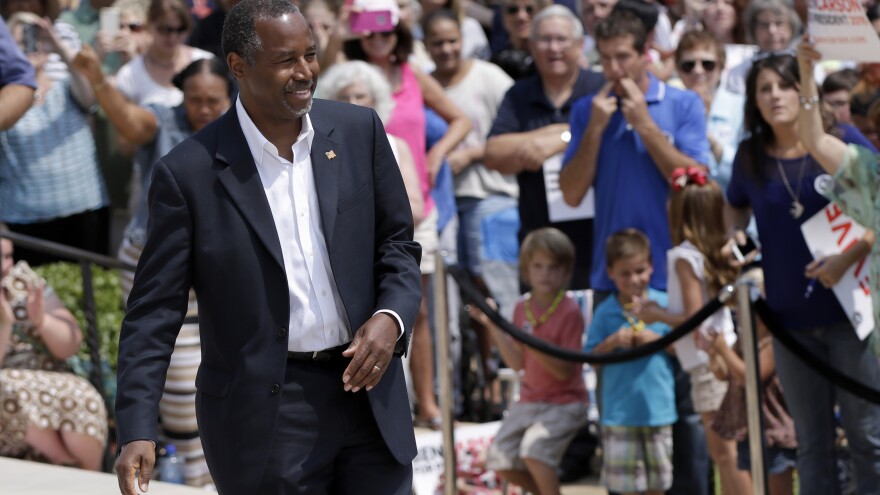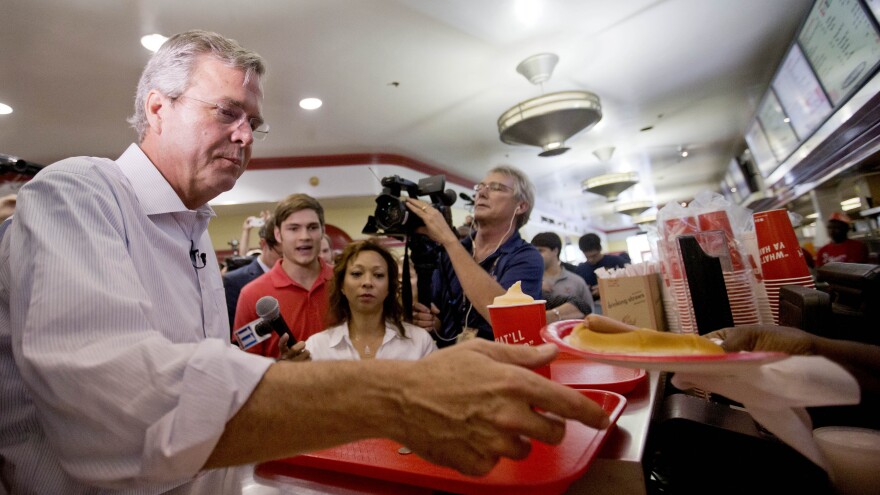The ingredients for a Southern campaign swing? Hometown endorsements, a stadium and Lynyrd Skynyrd blaring from the loudspeakers.
Donald Trump had them all when he took the stage at a recent stop in Mobile to the tune of "Sweet Home Alabama."
"Unbelievable," he said, seeing the estimated 30,000 people who came to hear his pitch.
"My whole energy and my whole being is going to be to make our country rich and to make our country great again," he said.
Trump has since campaigned in Tennessee as well. Candidates are expected to stop early and often in Iowa, New Hampshire and South Carolina with its first-in-the-South primary. But now they're dipping deeper into the region since Alabama, Arkansas, Georgia, Oklahoma, Tennessee, Texas and Virginia teamed to put their primaries early on the 2016 calendar — March 1.
State GOP leaders are lauding the benefits of this newfound attention.
"Isn't it a great day to be an Arkansas Republican?" asked state party chairman Doyle Webb as he introduced Ben Carson at an event in Little Rock.
"We are blessed again to have another one of our tremendous candidates here in the state of Arkansas," Webb said.

Carson told the audience they could have an even bigger say by getting their friends and families to the polls.
"In 2012, 30 million evangelicals did not vote," said Carson. He urged them to stand up for their values by voting.
"Let us fight to make it one nation under God, indivisible, with liberty and justice for all," Carson said.
For Republican candidates, the South is a region rich with social conservatives, and fraught with traditions. They've got to eat barbecue, stop at the ham house, and be up on college football rivalries. They've also got to engage on issues like abortion and same-sex marriage, where views in the South tend to be more conservative than the rest of the nation.

In Atlanta recently, Jeb Bush ordered a "yellow dog" at a downtown institution — the Varsity Drive-In.
No, he wasn't ordering a Southern yellow dog Democrat for lunch, but, in the local vernacular, a hot dog with mustard. Afterward, he told reporters he could compete in the South.
"I'm a conservative reformer with a proven record of results," Bush said.
Ohio Gov. John Kasich is also looking to burnish his conservative credentials. And he's getting help from Alabama Gov. Robert Bentley — the first Deep South governor to endorse in the presidential race. Bentley picked Kasich, a purple state governor, from a field that's packed with fellow Southerners. Kasich hopes it will smooth his way with Southern voters.
"It sends a signal in the South," Kasich said. "I'm headed from here to South Carolina and the first thing I'm going to tell them is 'Hey, guess what? I was just endorsed for president of the United States by the governor of Alabama.' It makes a big difference."
Texas Sen. Ted Cruz has also stumped in Alabama — at the University of Alabama's Bryant Denny Stadium in Tuscaloosa. He said with the compressed primary calendar, the South will be key in shaping the race.
"I think Alabama and the states across the South are going to play a critical role in ensuring that the next Republican nominee is a true and genuine conservative," says Cruz.
We used to be called flyover states. Now we're called fly-in states.
Party operatives can't remember the last time five presidential hopefuls were in Alabama — and all before Labor Day.
"We used to be called flyover states. Now we're called fly-in states," says Terry Lathan, chairman of the Alabama Republican Party.
"When we used to have our primaries later in the year, the table was mostly set," she said.
Now, she says, voters in Alabama and elsewhere in the South will actually help narrow the field.
"It could be a real game changer," said Lathan. "Because we're very conservative. So where are all those conservative votes going to go?"
The trick for Republicans is how to appeal to those conservative Southern voters early without alienating the broader audience they'll need next fall.
Copyright 2021 NPR. To see more, visit https://www.npr.org. 9(MDEwMTk5OTQ0MDEzNDkxMDYyMDQ2MjdiMw004))



